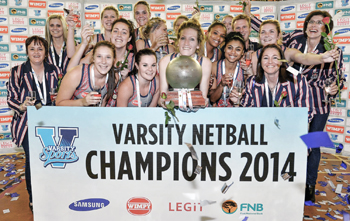
Photo: Catherine Kotze, SASPA
|
Kovsies has become the first team to successfully defend the Varstiy Netball title when they beat Tuks 49-42 in the 2014 final in Pretoria on Monday 20 October.
University of Pretoria (Tuks) might have been unbeaten for the entire 2014 tournament, but this did not hinder Kovsies in becoming the Varsity Netball champions for a second consecutive time.
From the outset, both these furiously focused teams fought hard and only after ample turnovers could Kovsies finally manage to open the score board.
The Mostert sisters, Karla and Tanya, won a couple of crucial balls, leaving the UFS dominating possession in the opening exchanges.
When Tuks eventually got to scoring, they could not stop the UFS from rushing to a 9-3 lead after the first ten minutes. The visitors had established a 13-5 advantage by the first break, keeping the Pretoria crowd quiet.
The home side came back shooting in the second quarter with great determination, fighting their way back into the game. Tuks ran hard, needing to work hard against Kovsies, who still managed to be in the lead with 22-16 at half-time.
Kovsies made good use of their power play early in the third quarter to stretch their lead further to 30-22. They made the most of their opportunities, going into the final quarter with a 39-31 upper hand.
Even though Tuks made a couple of changes during the final break, they could not avoid defeat in the end.
Kovsies’ Lauren-Lee Christians was also the player of the match, while the champion’s captain, Karla Mostert, was announced as the Player of the Tournament.
This hard-working defender made a number of crucial interventions alongside her sister Tanya in the final. Karla proved that she was the fans’ tournament favorite, claiming the most votes and winning a Samsung S4.